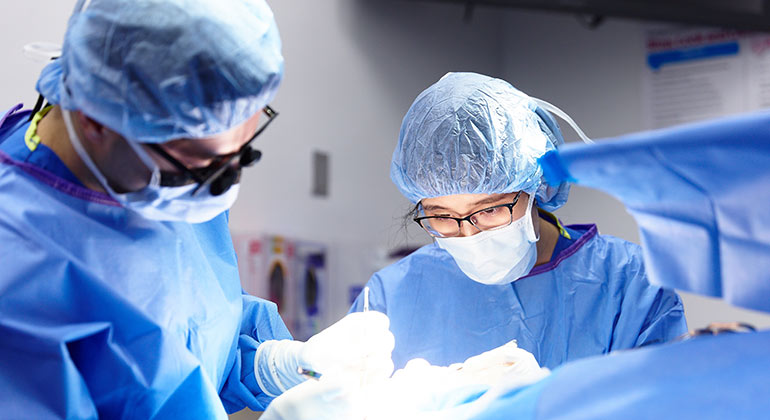
NYEE Residency Program Overview
The ophthalmology residency curriculum is multifaceted, offering clinical training, surgical training, and rotations in every ophthalmic specialty, as well as dedicated time for conferences, lectures, and research.
Resident Clinical Training
The residents have full responsibility for the patients they care for in the Eye Clinic under the supervision of dedicated faculty. First-year residents have exposure to each subspecialty clinic on multiple rotations throughout the year, while second- and third-year residents have exposure to each subspecialty clinic on block rotations. Inpatient ophthalmology consults are done in the second year.
Resident-run clinics are offered in every subspecialty including the following:
Ocular Oncology Resident Training
Residents trained in the Ocular Oncology Service become skilled in the evaluation and differential diagnosis of ocular tumors. They take responsibility for patients and perform eye cancer surgeries while supervised by an attending physician. Surgical procedures include biopsy techniques, laser photocoagulation, cryotherapy, local resection, orbitotomy, enucleation, orbital exenteration, and ophthalmic plaque radiotherapy. The Ocular Oncology Service curriculum is organized for maximum learning:
- There are three hours of didactic instruction, and attendance at lectures is mandatory. In addition, the diagnosis and treatment of patients often generate spontaneous lectures in the clinical setting. Elements of patient education and informed consent are also discussed.
- From their experience, residents are expected to form a differential diagnosis, describe how that diagnosis was made, and suggest methods of treatment. During each clinic session, individual residents are asked questions, and an assessment is made about their current knowledge and reading habits.
- Resident research activities in ocular oncology are strongly encouraged. Manuscripts are generated from unusual cases, reviews, and basic science studies. Many investigational protocols are currently active within The Ocular Oncology Service.
Oculoplastic, Orbital, and Reconstructive Surgery Resident Training
The teaching program in Oculoplastic, Orbital, and Reconstructive Surgery includes formal lectures given during the first six months of each academic year, followed by a comprehensive written examination. Residents from each postgraduate year spend approximately eight weeks on rotation with the service. Trainees evaluate patients with the assistance of the fellow and are then presented to the attending for discussion of appropriate management.
Residents also examine patients presenting with orbital and eyelid trauma and other urgent oculoplastic problems. A rotating schedule of oculoplastic trauma attendings assures that senior staff members are available to assist the residents in all cases that require urgent attention or surgery. Clinic organization allows for continuity of care and an effective academic and surgical experience for the residents. Residents block surgical time every week to perform cases with assigned members of the Oculoplastic Service.
During the clinic sessions, specific cases are chosen for more detailed discussion. On a regular basis, the residents have the opportunity to evaluate and treat a wide range of congenital and acquired eyelid abnormalities, lacrimal (tear duct) problems, periorbital and eyelid tumors, and a significant number of eye socket problems. Systemic illnesses that may affect the orbit, including thyroid disease, and infectious and inflammatory diseases of the orbits and tissues around the eyes, are seen frequently in our clinics and are treated medically and surgically as indicated.
CT and MRI studies are reviewed weekly or immediately as required. Members of the service have the opportunity to review the histopathology of all surgical cases with the Ophthalmic Pathology Service. We strongly encourage a multidisciplinary approach and work closely with the Pathology and Radiology departments, as well as Neuro-Ophthalmology and Ocular Oncology services. In addition, the relationships with the Medical Oncology and Radiotherapy departments, Mount Sinai St. Luke’s, and Mount Sinai West are very strong.
By the completion of the residents’ rotations, it is expected that the residents will be proficient in nasolacrimal duct probing and intubation, dacryocystorhinostomy, entropion and ectropion repair, eyelid laceration repair, enucleation, evisceration, and ptosis repair. Over the past three decades, 30 national and more than 80 international fellows have trained in our program, many of whom have become leaders as clinicians and teachers, both here and abroad.
Retina Resident Training
The senior retina resident attends all surgical retina clinics and organizes the surgical schedule in concert with the attendance of the service. Surgery is performed under the direct supervision of an attending surgeon, who makes decisions based on the resident’s ability and the patient’s needs. In addition, the resident is responsible for monitoring all in-house retinal patients, assisting and supervising the junior resident, and is available for retinal consultation on all clinic cases. The senior resident is expected to consult with the Chief of Service on any unusual cases, reoperations, and scheduling problems. The average number of surgical cases done by each senior resident is 12 scleral buckles, 14 vitrectomies, and four cryopexies.
The junior resident is involved primarily with medical retinal patients, learning advanced diagnostic procedures, performing and reading fluorescein angiograms, and performing laser surgery. Each junior resident performs approximately 100 fluorescein angiograms and 130 laser treatments, and examines 35 neonates.
Neuro-Ophthalmology Resident Training
The curriculum for neuro-ophthalmology subspecialty training in the residency includes a weekly outpatient neuro-ophthalmology clinic, patients hospitalized from the neuro-ophthalmology service at NYEE and on the neurology service, and daily telephone or in-person consultations of neuro-ophthalmology patients, seen in either clinics or the Emergency Room at NYEE. Residents and fellows evaluate the patients and lead discussion with an attending neuro-ophthalmologist concerning the diagnosis, evaluation, and treatment.
The service has a strong collaboration with neuroradiology, and residents are instructed on the evaluation of CT and MR scans. In addition to the educational opportunities centering on patients, there are formal neuro-ophthalmological lectures as part of the overall educational program, as well as neuro-ophthalmology case study specific Ophthalmology departmental grand rounds presentations.
Pediatric Ophthalmology and Strabismus Resident Training
The Resident Training program benefits from the diversity and number of cases seen in the Pediatric Ophthalmology, Orthoptics and Strabismus Service. In addition to hands on interaction with patients, residents attend lectures on a wide range of subjects concerning pediatric ophthalmology and strabismus, which helps to prepare them for their OKAP examinations, as well as for their general training in ophthalmology. Clinical conferences regarding interesting strabismus and pediatric cases are held weekly. Proper evaluation for further medical care or surgery is done with participation of all the residents and attending physicians.
Ophthalmic Pathology Resident Training
Ophthalmology residents rotate in Ophthalmic Pathology during their PGY2 and PGY3 years of training, getting live exposure to microscopic images, frozen sections, cytology, and microbiology. They receive lectures remotely in addition to their onsite training.
Cornea, External Disease, Refractive Surgery, and Contact Lens Clinics
Our Cornea and Refractive Surgery residents and attending physicians have access to the latest technologies, including corneal topography, WaveScan™ analysis, femtosecond lasers, and excimer laser correction to treat refractive errors. Cornea, External Disease, and Refractive Surgery Clinics are conducted three half-days per week concurrently with a Contact Lens Clinic. Approximately 2,500 patients are seen per year in the Cornea Clinic, and 1,500 patients are seen in the Contact Lens Clinic. Resident clinics and surgeries are staffed at all times by an attending physician. Non emergent cornea cases are regularly scheduled one day per week.
Instruction in the surgical treatment of corneal diseases includes lectures and wet lab courses given in our microsurgical laboratory. Nonemergent corneal surgery is regularly scheduled one day per week. Residents also receive extensive training in laser vision correction, including lectures, and attend laser and microkeratome courses throughout the year. Residents will have the opportunity to perform laser vision correction procedures, and can achieve certification in these techniques prior to the end of their residency. The Cornea and Refractive Surgery Service also sponsors a series of 15 one-hour lectures, covering all areas of the specialty. Following this series of lectures, an examination prepared by the attending staff is administered to each resident and reviewed individually. To help prepare residents for this OKAP examination, a three-hour board review series is conducted prior to the exam.
Residents are encouraged to initiate and complete research projects in either clinical or basic sciences. Numerous abstracts, presentations, and manuscripts are generated annually and accepted in peer-reviewed journals. Cases are presented monthly during the Cornea and Refractive Surgery Service Rounds and quarterly at departmental grand rounds. In addition, there is a monthly OKAP board review series.
Uveitis and Ocular Immunology Resident Training
First- and second-year residents are taught the methodical approach to the uveitis patient. History-taking skills, review of systems, and physical examination are critical in establishing a targeted diagnostic workup. Specific management of infectious etiologies, such as acute retinal necrosis, ocular syphilis, and toxoplasmosis, are learned. Additionally, the PGY-2 and PGY- 3 residents learn about the management of chronic noninfectious inflammatory disease, including the appropriate use of regional and systemic steroids and, in close conjunction with rheumatologists, the indication and treatment with systemic immunosuppressives, such as methotrexate, adalimumab, and cyclophosphamide.
Senior PGY-4 residents learn the perioperative stabilization of the uveitis patient who will undergo cataract and intraocular surgery. Seniors also learn the intraoperative management of uveitis patients, including anterior and posterior synechiolysis, iris hooks, and intraocular lens choice. Residents gain an understanding of the indications for endolaser, pars plana vitrectomy/vitreous biopsy, and chorioretinal biopsy in these patients.
Resident Surgical Training
Residents gain experience as primary surgeons in all types of ophthalmic surgery, spanning all subspecialties and utilizing the latest technologies. This wide variety of surgeries includes, but is not limited to: LASIK/PRK, complex cataracts, pediatric cataracts, presbyopia and astigmatism correcting IOLs, pterygium surgery, iris reconstruction, amniotic membrane transplantation, DSEK, keratoprosthesis, pars plana vitrectomy, strabismus surgery, glaucoma surgery, eyelid and orbital reconstruction, trauma surgery, plaque radiation therapy, ocular surface and orbital tumor resection.
A very important aspect of surgical training at the New York Eye and Ear Infirmary of Mount Sinai is the Jorge N. Buxton, MD, Microsurgical Educational Center. Residents have 24-hour access to the microsurgical lab, which is equipped with microscopes, surgical instruments, and practice eyes. Residents also have the opportunity to use the Eyesi® Surgical simulator for practicing cataract surgery and vitrectomy. Surgical education is further enhanced by hands-on microsurgical wet lab courses for each subspecialty led by dedicated faculty.
Program Conferences and Lectures
Didactic education for the residents is formalized with lectures, conferences, courses, and grand rounds. An overview of the educational activities offered to residents includes:
- Weekly grand rounds, Friday mornings at 7:30 am
- Journal Club, 8-12 times per year in all specialties
- Weekly strabismus surgical conference during second year of residency
- Hands-on microsurgical wet lab courses for each subspecialty
- Eyesi Surgical simulator training for cataract and vitreo-retinal surgery
- OKAP and Board Review Course, held in January and February of each year
- Option to attend both the New York Eye and Ear Infirmary and the Massachusetts Eye and Ear Infirmary cataract course
- Refractive surgery lectures and courses with the ability to become certified
Ophthalmology Resident Research
All residents are required to work on a meaningful research project over the course of their residency and present their work at the Annual NYEE Resident Research Day. To facilitate this, residents have dedicated research time in their first and second years. Financial support is given for travel to meetings in the continental United States for the purpose of presenting research. The Department of Ophthalmology also offers grants and other funding to support resident research.
